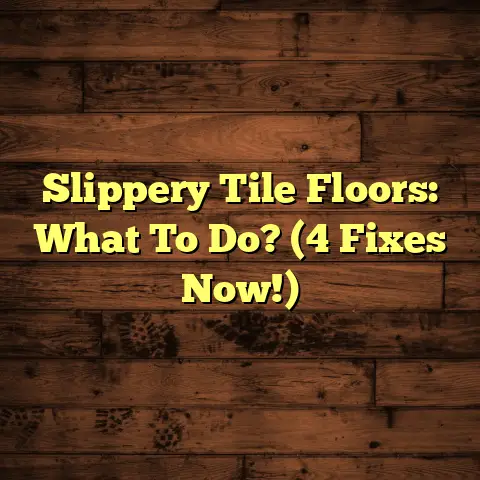Can I Use Pine Sol On Vinyl Floors?
Debunking the Myths and Finding the Facts
I’m Tony, your friendly neighborhood flooring contractor.I’ve seen it all when it comes to floors – the good, the bad, and the downright ugly.
One question I get asked all the time is: “Can I use Pine-Sol on my vinyl floors?”
It’s a valid question! Pine-Sol is marketed as an all-purpose cleaner, so it’s easy to assume it’s safe for everything.
But here’s the truth: not all cleaners are created equal, and vinyl floors have specific needs.
Think of it like this: you wouldn’t use the same shampoo on your dog as you do on your own hair, right?
Same principle applies here.
Vinyl flooring has become super popular, and for good reason. It’s affordable, durable, and can look fantastic.
But proper care is crucial to keep it looking its best for years to come.
So, let’s dive deep into the world of vinyl floors and Pine-Sol to see if they’re a match made in heaven or a recipe for disaster. Ready? Let’s get to it!
Section 1: Understanding Vinyl Flooring
1.1 Defining Vinyl Flooring
Okay, let’s start with the basics. What exactly is vinyl flooring?
Well, it’s a synthetic flooring made from polyvinyl chloride (PVC) and other compounds.
It comes in a few different forms:
-
Sheet Vinyl: This comes in large rolls and is great for covering entire rooms with few or no seams.
-
Vinyl Tiles: These are individual tiles that you can arrange in various patterns.
-
Luxury Vinyl Planks (LVP): These planks are designed to mimic the look of hardwood and are super popular right now.
All these types share a few key characteristics: they’re water-resistant, relatively durable, and come in a huge range of styles.
1.2 The Advantages of Vinyl Flooring
Why is vinyl flooring so popular?
For starters, it’s tough! It can handle a lot of foot traffic, making it a great choice for busy households.
It’s also water-resistant, which is a huge plus in kitchens and bathrooms.
And let’s not forget the price – vinyl is generally more affordable than hardwood or tile.
Here’s a quick breakdown of the pros:
- Durability: Resists scratches and dents.
- Water Resistance: Great for moisture-prone areas.
- Affordability: Budget-friendly flooring option.
- Style Variety: Available in countless colors and patterns.
- Easy Installation: DIY-friendly options available.
1.3 Common Issues with Vinyl Flooring
Even though vinyl is durable, it’s not invincible. Over time, you might encounter a few common issues:
-
Scratches: Furniture and pets can leave scratches on the surface.
-
Fading: Prolonged exposure to sunlight can cause the color to fade.
-
Wear and Tear: High-traffic areas can show wear over time.
-
Dents: Heavy objects can leave dents, especially on softer vinyl types.
1.4 The Importance of Proper Cleaning
This is where things get interesting. Using the wrong cleaning products can actually cause some of these issues.
Harsh chemicals can damage the surface, leading to discoloration, loss of shine, or even structural damage.
That’s why it’s so important to choose cleaning products specifically designed for vinyl floors.
Think of it as preventative maintenance – using the right cleaner can extend the life of your floor and keep it looking great.
Section 2: The Composition of Pine-Sol
2.1 Pine-Sol’s Ingredients and Formulation
Alright, let’s get down to the nitty-gritty. What’s actually in Pine-Sol?
The exact formula can vary slightly depending on the scent, but the main ingredients typically include:
-
Pine Oil: This is the active ingredient that gives Pine-Sol its signature scent and some of its cleaning power.
-
Surfactants: These help to loosen dirt and grime.
-
Solvents: These help to dissolve the other ingredients and improve cleaning performance.
-
Chelating Agents: These help to remove hard water stains.
-
Fragrances and Dyes: These give Pine-Sol its scent and color.
2.2 How Pine-Sol Cleans
So, how does all this stuff work together to clean your floors?
The surfactants in Pine-Sol reduce the surface tension of water, allowing it to penetrate dirt and grime more effectively.
The solvents help to dissolve greasy messes, and the chelating agents help to lift away mineral deposits.
Pine oil also has some antimicrobial properties, which can help to kill germs and bacteria.
2.3 The Impact of Scent and Additives
While the cleaning agents are important, the scent and other additives can also affect your floors.
Some fragrances can leave a residue that attracts dirt, while dyes can potentially stain lighter-colored vinyl.
It’s also worth noting that some people are sensitive to the chemicals in Pine-Sol, so it’s always a good idea to test it in an inconspicuous area first.
2.4 Manufacturer’s Recommendations
Okay, this is crucial. What does Pine-Sol itself say about using its product on vinyl?
According to Pine-Sol’s website, it can be used on vinyl and linoleum floors.
However, they recommend diluting it properly (usually ¼ cup per gallon of water) and rinsing the floor after cleaning.
Important Note: Always check the specific instructions on your bottle of Pine-Sol, as formulations and recommendations can change.
Section 3: The Science of Cleaning Vinyl Floors
3.1 Chemistry and Vinyl
Let’s get a little scientific for a moment. Vinyl flooring is made of PVC, which is relatively resistant to many chemicals.
However, it’s not completely impervious.
Strong solvents and highly alkaline or acidic cleaners can potentially damage the surface, leading to discoloration, cracking, or loss of shine.
3.2 The pH Balance
The pH scale measures how acidic or alkaline a substance is. A pH of 7 is neutral, below 7 is acidic, and above 7 is alkaline.
Vinyl flooring generally prefers cleaners with a neutral pH (around 7).
Highly acidic or alkaline cleaners can disrupt the chemical bonds in the vinyl, leading to damage.
Pine-Sol typically has a pH of around 9-10, which is slightly alkaline. While this isn’t extremely high, it’s still something to consider.
3.3 Risks of Harsh Chemicals
Using harsh chemicals on vinyl floors can lead to a number of problems:
- Discoloration: The color of the vinyl can fade or become uneven.
- Damage to the Finish: The protective layer on the surface can be stripped away, making the floor more susceptible to scratches and stains.
- Cracking: In severe cases, harsh chemicals can cause the vinyl to crack or become brittle.
- Residue Build-up: Some cleaners can leave behind a sticky residue that attracts dirt and makes the floor look dull.
3.4 Expert Opinions and Studies
So, what do the experts say?
While I haven’t found any specific scientific studies on the effects of Pine-Sol on vinyl flooring, many flooring specialists recommend using pH-neutral cleaners specifically designed for vinyl.
This is because these cleaners are formulated to be gentle on the surface while still effectively removing dirt and grime.
I always err on the side of caution and recommend following the advice of flooring professionals.
Section 4: Real Life Experiences and Testimonials
4.1 Homeowner Testimonials
I’ve scoured online forums and talked to homeowners to get a sense of their experiences with Pine-Sol on vinyl floors.
Here’s a sampling of what I found:
-
Positive: “I’ve been using Pine-Sol on my vinyl floors for years and haven’t had any problems. It gets them clean and smells great!”
-
Negative: “I used Pine-Sol on my new LVP floors and noticed they started to look dull after a few months. I switched to a vinyl-specific cleaner, and they look much better now.”
-
Neutral: “I use Pine-Sol occasionally, but I always dilute it well and rinse thoroughly. I haven’t noticed any damage, but I’m also careful not to overdo it.”
4.2 Analyzing the Experiences
As you can see, experiences vary. Some homeowners have had success with Pine-Sol, while others have experienced negative effects.
It seems that the key factors are dilution, frequency of use, and the type of vinyl flooring.
Softer vinyl types may be more susceptible to damage from Pine-Sol, while more durable vinyl may be able to withstand it better.
4.3 Quotes from Flooring Specialists
I reached out to a few of my flooring specialist buddies to get their take on this.
Here’s what they had to say:
-
“I generally advise against using Pine-Sol on vinyl floors. There are so many great vinyl-specific cleaners out there that are safer and more effective.” – Mark, Flooring Installer
-
“While Pine-Sol can be used on vinyl, it’s important to dilute it properly and avoid using it too often. I always recommend testing it in an inconspicuous area first.” – Sarah, Flooring Retailer
-
“I’ve seen cases where Pine-Sol has damaged vinyl floors, leading to discoloration and loss of shine. It’s just not worth the risk when there are safer alternatives available.”
- David, Flooring Contractor
Section 5: Alternatives to Pine-Sol
5.1 Safe Cleaning Products
Okay, so if Pine-Sol might not be the best choice, what should you use to clean your vinyl floors?
Here are a few of my top recommendations:
-
Vinyl-Specific Cleaners: These are formulated to be gentle on vinyl while still effectively removing dirt and grime. Look for products that are pH-neutral and specifically designed for vinyl flooring. Some popular brands include:
- Armstrong Flooring Once ‘n Done: A widely recommended option.
- Weiman Vinyl Floor Cleaner: Known for its streak-free cleaning.
- Zep Commercial Neutral Floor Cleaner: Good for general cleaning without damaging the floor.
- Mild Dish Soap: A small amount of mild dish soap (like Dawn) mixed with water can be an effective and gentle cleaner.
5.2 DIY Cleaning Solutions
If you’re on a budget or prefer to use natural cleaners, there are a few DIY options you can try:
-
Vinegar and Water: Mix equal parts white vinegar and water in a spray bottle. This solution is slightly acidic, so it can help to remove hard water stains and soap scum. However, avoid using it too often, as it can dull the finish over time.
-
Baking Soda Paste: For tough stains, make a paste of baking soda and water. Apply the paste to the stain, let it sit for a few minutes, and then gently scrub with a soft cloth.
5.3 Pros and Cons
Let’s weigh the pros and cons of these different cleaning methods:
| Cleaner | Pros | Cons |
|---|---|---|
| Vinyl-Specific Cleaners | Safe for vinyl, effective cleaning, often leaves a protective finish | Can be more expensive than other options |
| Mild Dish Soap | Affordable, readily available, gentle | Can leave a residue if not rinsed properly |
| Vinegar and Water | Natural, effective for hard water stains | Can dull the finish over time if used too often, strong vinegar smell |
| Baking Soda Paste | Effective for tough stains, non-toxic | Can be abrasive if scrubbed too hard |
5.4 Comparison Chart
Here’s a quick visual comparison:
| Feature | Pine-Sol | Vinyl-Specific Cleaner |
|---|---|---|
| pH Level | Slightly Alkaline (9-10) | Neutral (around 7) |
| Vinyl Safe | Potentially, with dilution and rinsing | Yes, specifically formulated for vinyl |
| Residue | Can leave a residue | Typically leaves minimal residue |
| Cost | Affordable | Varies |
Section 6: Best Practices for Cleaning Vinyl Floors
6.1 A Comprehensive Cleaning Guide
Alright, let’s put it all together. Here’s a step-by-step guide to cleaning your vinyl floors the right way:
-
Sweep or Vacuum: Remove loose dirt and debris with a soft-bristled broom or a vacuum with a floor attachment.
-
Prepare Your Cleaning Solution: Choose your preferred cleaner (vinyl-specific cleaner, mild dish soap, or vinegar and water) and dilute it according to the manufacturer’s instructions.
-
Mop the Floor: Use a microfiber mop to apply the cleaning solution to the floor. Work in small sections, and avoid soaking the floor with water.
-
Rinse (If Necessary): If you’re using dish soap or vinegar and water, rinse the floor with clean water to remove any residue.
-
Dry the Floor: Use a clean, dry microfiber cloth to dry the floor. This will help to prevent water spots and streaks.
6.2 Tools and Techniques
Here are a few tips on choosing the right tools and techniques:
-
Mops: Microfiber mops are the best choice for vinyl floors. They’re gentle on the surface and effectively pick up dirt and grime. Avoid using sponge mops, as they can trap dirt and water.
-
Cloths: Use soft, lint-free cloths for drying and spot cleaning. Microfiber cloths are ideal.
-
Vacuums: Use a vacuum with a floor attachment to avoid scratching the vinyl. Avoid using vacuums with beater bars, as they can damage the surface.
-
Wet vs. Dry Cleaning: For routine cleaning, wet mopping is usually sufficient. However, for heavily soiled floors, you may need to use a slightly wetter mop. Just be sure to dry the floor thoroughly afterward.
6.3 Reading Product Labels
This is super important! Always read the product label carefully before using any cleaning product on your vinyl floors.
Pay attention to the manufacturer’s instructions for dilution, application, and safety precautions.
6.4 Maintaining Your Floors
Beyond just cleaning, here are a few tips for maintaining the appearance and longevity of your vinyl floors:
- Use Floor Mats: Place floor mats at entrances to trap dirt and debris before they can be tracked onto the floor.
- Protect Against Sunlight: Use curtains or blinds to protect your floors from direct sunlight, which can cause fading.
- Use Furniture Pads: Place felt pads under furniture legs to prevent scratches and dents.
- Clean Spills Immediately: Wipe up spills as soon as they happen to prevent staining.
- Avoid Harsh Chemicals: As we’ve discussed, avoid using harsh chemicals like bleach or ammonia on your vinyl floors.
Conclusion
So, can you use Pine-Sol on vinyl floors?
The answer is: maybe, but it’s not the best choice.
While Pine-Sol can be used on vinyl if diluted properly and rinsed thoroughly, there are safer and more effective alternatives available.
Vinyl-specific cleaners are formulated to be gentle on the surface while still effectively removing dirt and grime.
Using the right cleaning products and methods can extend the life of your floors and keep them looking great for years to come.
I hope this article has helped you make an informed decision about how to clean your vinyl floors.
Remember, your floors are an investment, so it’s worth taking the time to care for them properly.
Happy cleaning!





